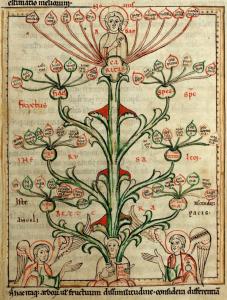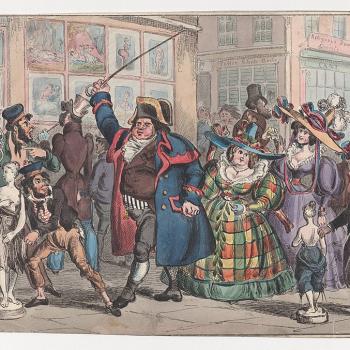
There are many teachings proclaimed by the Christian faith. While each have their value and significance, we must not presume they are all equally important. They are not. Nor should we think that all teachings hold the same level of inspiration. Many things which are taught are derivative in nature and in value; while they are connected to greater truths, they are derived more through human reason, with all the limitations and implications connected with it. This is why such teachings are not central to the faith, indeed, can and often need reform. But even those which come to us from revelation are not always as central to others. Some work to highlight greater truths. This is why, in ecumenical dialogues, we must focus on what is most important:
Moreover, in ecumenical dialogue, Catholic theologians standing fast by the teaching of the Church and investigating the divine mysteries with the separated brethren must proceed with love for the truth, with charity, and with humility. When comparing doctrines with one another, they should remember that in Catholic doctrine there exists a “hierarchy” of truths, since they vary in their relation to the fundamental Christian faith. Thus the way will be opened by which through fraternal rivalry all will be stirred to a deeper understanding and a clearer presentation of the unfathomable riches of Christ.[1]
Engaging the greater truths allows us to see how much we truly believe in common, and with it, provides a way for better cooperation among Christians, seeing that they truly are connected to each other through their faith in Christ. With greater cooperation, there is also the hope for Christian unity:
Before the whole world let all Christians confess their faith in the triune God, one and three in the incarnate Son of God, our Redeemer and Lord. United in their efforts, and with mutual respect, let them bear witness to our common hope which does not play us false. In these days when cooperation in social matters is so widespread, all men without exception are called to work together, with much greater reason all those who believe in God, but most of all, all Christians in that they bear the name of Christ. Cooperation among Christians vividly expresses the relationship which in fact already unites them, and it sets in clearer relief the features of Christ the Servant. This cooperation, which has already begun in many countries, should be developed more and more, particularly in regions where a social and technical evolution is taking place be it in a just evaluation of the dignity of the human person, the establishment of the blessings of peace, the application of Gospel principles to social life, the advancement of the arts and sciences in a truly Christian spirit, or also in the use of various remedies to relieve the afflictions of our times such as famine and natural disasters, illiteracy and poverty, housing shortage and the unequal distribution of wealth. All believers in Christ can, through this cooperation, be led to acquire a better knowledge and appreciation of one another, and so pave the way to Christian unity. [2]
This, however, is also true, not just in ecumenical dialogue, but within the Catholic faith as a whole. We must always keep in mind the hierarchy of truths. Beyond what is taught in unison with the rest of the Christian faith, our belief in the sacraments, in the communion of saints, and the role the church should have in history (even if it often fails to live out that role) bring us together and has us remain Catholic. Beyond them, there are many teachings, many which Catholics have some level of doubt or confusion about; despite these concerns, they remain Catholic because they hold to the primary truths of the faith (no matter how many disappointments they might have with the institutional church itself, they see value in the church itself, if for no other reason, because of the grace which is shared through it).
The hierarchy of truths includes moral teachings, but morality is often taught and reflected upon in its own category because goodness and the truth, though united, are usually examined as distinct but related transcendentals. And, just as there is a hierarchy of truths which reflect dogmatic and doctrinal teachings, moral concerns also come to us with a hierarchy of its own, with some elements far more fundamental than others. This means that some acts have far more moral weight than others, as Pope Francis explained through an examination of St. Thomas Aquinas on the matter:
Saint Thomas Aquinas taught that the Church’s moral teaching has its own “hierarchy”, in the virtues and in the acts which proceed from them. What counts above all else is “faith working through love” (Gal 5:6). Works of love directed to one’s neighbour are the most perfect external manifestation of the interior grace of the Spirit: “The foundation of the New Law is in the grace of the Holy Spirit, who is manifested in the faith which works through love”. Thomas thus explains that, as far as external works are concerned, mercy is the greatest of all the virtues: “In itself mercy is the greatest of the virtues, since all the others revolve around it and, more than this, it makes up for their deficiencies. This is particular to the superior virtue, and as such it is proper to God to have mercy, through which his omnipotence is manifested to the greatest degree”.[3]
The hierarchy of virtues is centered upon love, which makes love and its engagement of the greatest importance; when we ignore this and find ourselves focusing upon some secondary considerations, we risk becoming rigid legalists who show more concern for derivative rules than what those rules are meant to encourage and establish. This is what happens when people misconstrue categories used in moral theology. For example, when the category of “intrinsic evil” is mentioned, many think intrinsic evils are something which are absolutely evil (with no potential of goodness intended with them) as well as being of the gravest kind of evil there is. There is, in truth, no such thing as absolute evil – every evil has some perverted good at its root, and so intrinsic evil does not mean something is absolutely evil, rather, that it is something which always leads us away from the fullness of the good no matter what intention lay behind it. The error involved with intrinsic evil can be very slight, for example, a “white lie.” Lies are intrinsically evil because their intention always has us go against the truth; however, error can be very slight, as we find with white lies, where there is some good desired by those who are lying for they do not want to needlessly hurt they person to whom they are lying. The reason why this is important is that once we understand there is a hierarchy of virtues, then we should realize our central concern should be on those moral issues which have the greatest moral weight instead of finding ourselves focused on and dealing with all kinds of secondary issues (or minor slights). Sadly, as Pope Francis explained, it is often the reverse which we find being preached in our churches:
For example, if in the course of the liturgical year a parish priest speaks about temperance ten times but only mentions charity or justice two or three times, an imbalance results, and precisely those virtues which ought to be most present in preaching and catechesis are overlooked. The same thing happens when we speak more about law than about grace, more about the Church than about Christ, more about the Pope than about God’s word. [4]
Our concern should especially be to engage those virtues which fight against those sins which cry up to heaven, that is, those sins which goes against charity:
The catechetical tradition also recalls that there are “sins that cry to heaven”: the blood of Abel, the sin of the Sodomites, the cry of the people oppressed in Egypt, the cry of the foreigner, the widow, and the orphan, injustice to the wage earner.[5]
What connects these sins is that each is a manifestation of injustice which denigrates someone else’s value. Thus, we must understand the main sin of Sodom was one of social injustice:
Behold, this was the guilt of your sister Sodom: she and her daughters had pride, surfeit of food, and prosperous ease, but did not aid the poor and needy. They were haughty, and did abominable things before me; therefore I removed them, when I saw it (Ezek. 16:49-50 RSV).
Social justice concerns, as both Scripture and tradition indicate, are fundamental and so they should be at the forefront of our moral considerations. Sadly, however, we have let out focus shift away to secondary, sometimes even petty, concerns, such as what people wear or the kinds of books they read. We are all sinners, we have all failed charity, but many of us end up thinking we are not guilty of great sins because we do not engage the actions which we despise. And it is this which often motivates our discussion of morality: not the actual moral worth of the action, but our feelings concerning them. As we despise many insignificant sins, we are not likely to do them, and because we have made more out of them than they are worth, we begin to make more out of ourselves, promoting ourselves are paragons of virtue. But that just shows how far we are from virtue; indeed, as St. Salvian warns us, we end up becoming far more vile than those we deride because of our haughty nature “Indeed, the greatest accuser of evil men is one who, in arrogance, takes advantage of innocence. Among many guilty of the same crimes none is more criminal than he who does not think himself guilty.”[6]
The hierarchy of truths, which includes teachings about morality, and the hierarchy of virtues contained within such teachings, is important, because its helps keep us focused on those concerns which have the most value, but also show us how and why, even if we have issues with secondary considerations concerning faith or morals, we still can be seen as holding to the foundation of the truth and so are not disconnected from the faith itself. We are Christian because of Christ and the central truths Christ revealed to us; if we focus on secondary things, and make our Christianity based upon those, we risk turning away from the greater truth; if we do so, we will slowly but surely find ourselves believing a simulacra of the Christian faith and not the Christian faith itself.
[1] Unitatis reditegratio. Vatican translation. ¶11.
[2] Unitatis reditegratio, ¶12.
[3] Pope Francis, Evangelii Gaudium. Vatican translation. ¶37.
[4] Pope Francis, Evangelii Gaudium, ¶38.
[5] Catechism of the Catholic Church. #1867.
[6] Salvian the Presbyter, “The Governance of God” in The Writings of Salvian the Presbyter. Trans. Jeremiah F. O’Sullivan (Washington, DC: CUA Press, 1962), 111.
Stay in touch! Like A Little Bit of Nothing on Facebook.
If you liked what you read, please consider sharing it with your friends and family!












